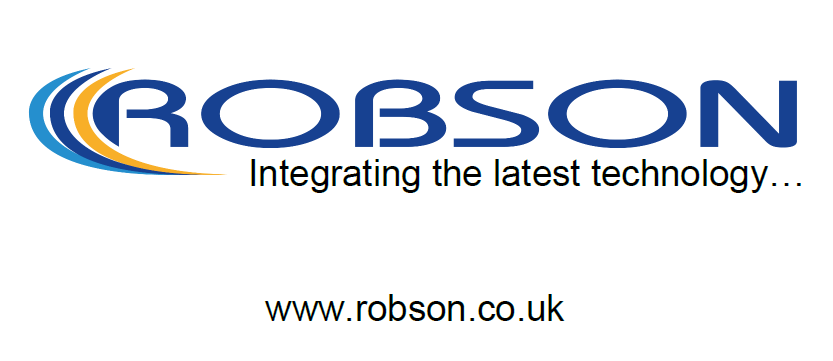Case Study - London Stansted Airport Baggage System Integration
| Company | Robson Handling Technology |
|---|---|
| Date | 27.07.2022 |
Project: Stansted Airport – Shoreline (Click here to Download as a PDF)
- Introduction
Robson Handling Technology were awarded a contract by Stansted Airport to expand an existing, temporary twelve desk shoreline system into a thirty-desk dual feed line solution feeding a new HBS sortation area with two new EDS machines. This new system was part of a move towards a reconfiguration of their island check in systems to a shoreline system to allow for future passenger growth whilst providing contingency for all the existing EDS systems.
As part of this solution, Robson Handling technology proposed several new technologies which provided Stansted Airport with a more efficient baggage system, with reduced power consumption, CO2 emissions and easier maintenance. Central to this solution was a distributed, single line installation controls architecture which de-risks the installation phase of the project, allows easier maintenance and facilitates the mobilisation of baggage operators. This, coupled with the Artificial Intelligence Human Intruder Detection system, vertical baggage lifts and camera based tag readers, made the solution technically intensive and relied on Robson’s expertise in integrating the very latest beneficial technologies into the baggage system.
- Who is Stansted Airport?
Stansted Airport is the fourth busiest airport in the UK serving over 25 million passengers each year.
Stansted Airport is the home to 20 airlines with planes flying to over 140 destinations covering 34 countries across the world.
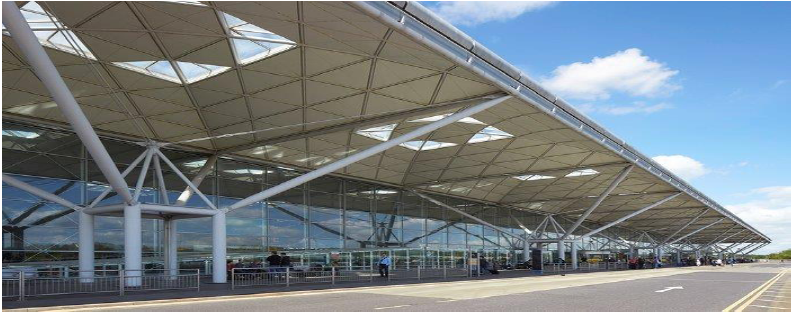
- The new Shoreline System Phase 1 incorporating:
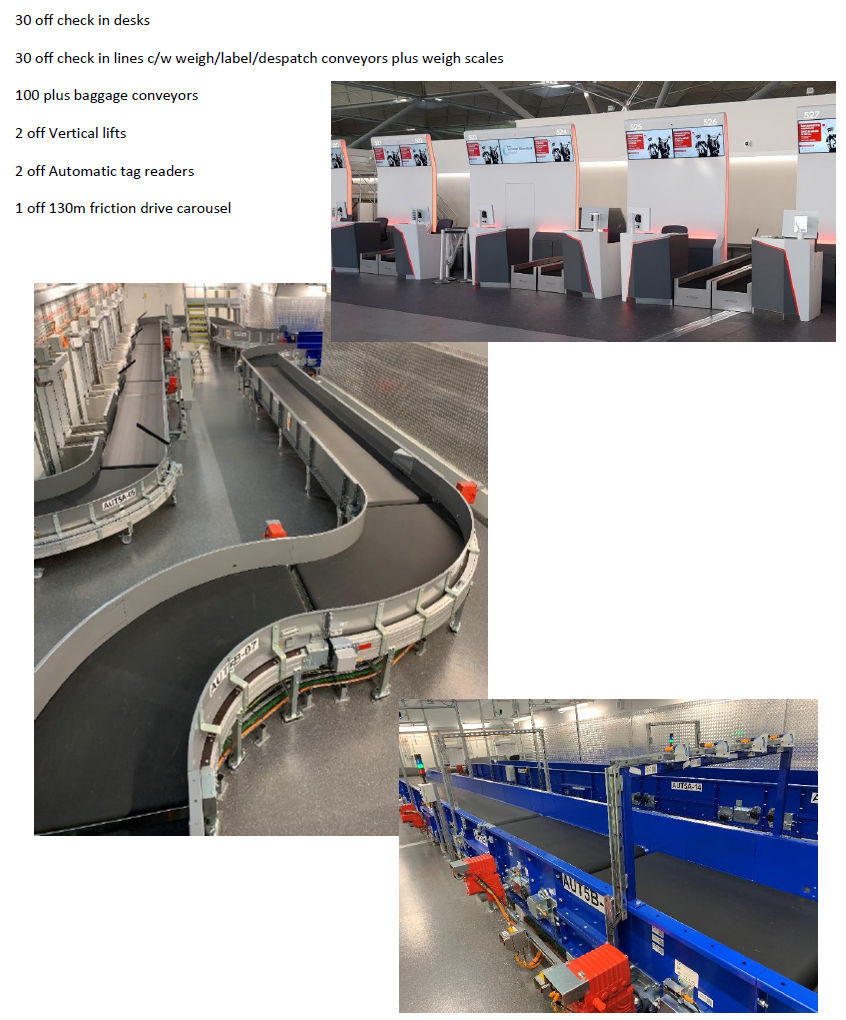
- Phase 2 incorporating:
2 off EDS machines plus conveyors
4 off Automatic tag readers
2 off chutes
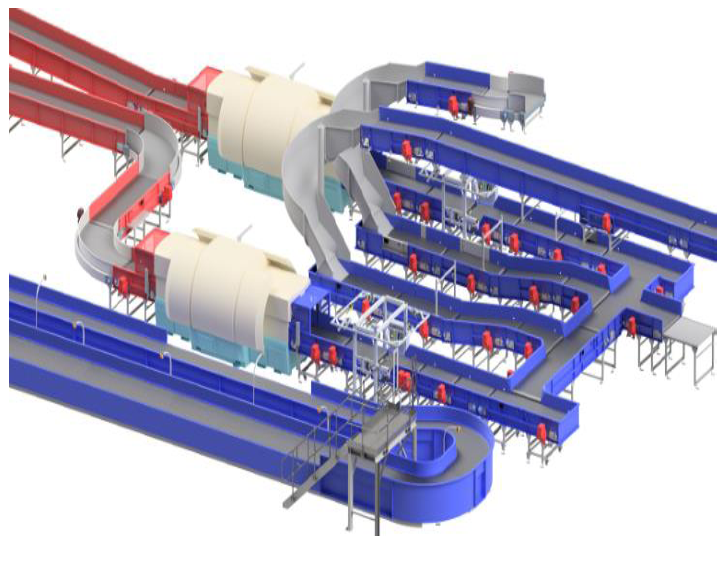
- Key benefits from investing in the new system?
Additional capacity was a key driver for the project to align with Stansted Airport’s growth projections. The system delivers both additional check in and EDS capacity. Furthermore, the system provides resilience in case of failure of the existing baggage system and is designed to for additional future expansion once required. This allows the airport to minimise current capital investment whilst installing an efficient baggage design with future capacity concepts which are understood by Stansted Airport.
- Latest technology / features installed on the new system:
Check in Desks
The open back monolith design of the check in desk is protected from unauthorised access via a combination of infra-red and camera-based AI point cloud technologies.
The desk’s airline designation is represented both on a large LED backscreen and by colouration of the monolith by LED’s embedded into the monolith structure.
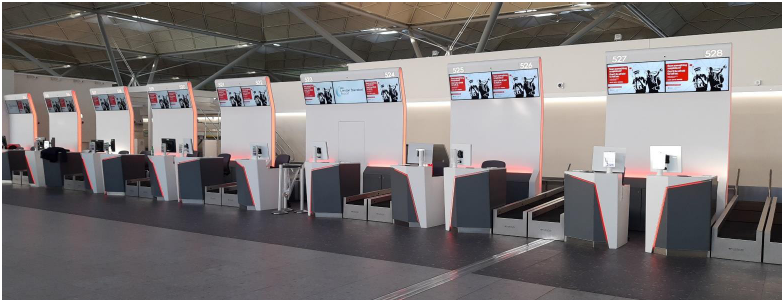
Robson Smart Line Conveyor Control
All conveyors within the system leverage Robson’s advanced dynamic-speed control software as standard, which optimises the bag journey in terms of energy efficiency, bag presentation, and journey time.
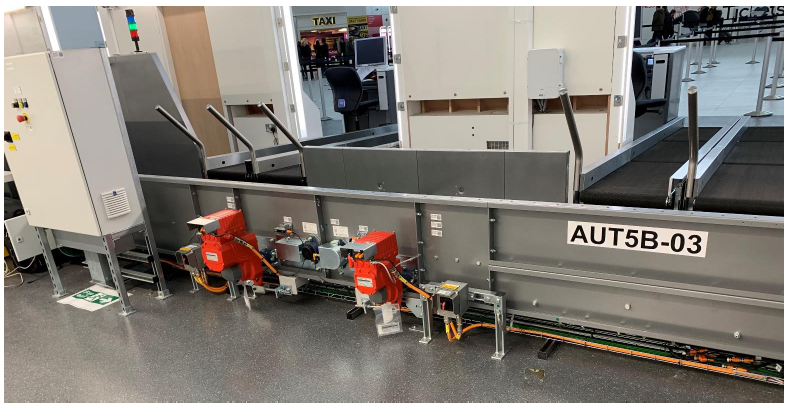
Energy Efficiency
Permanent magnet IE4 motors are used throughout the solution which bring significant energy savings over their IE2 counterparts of up to 50%. Furthermore, the Robson software and dynamic speed control runs these motors in a more efficient manner, further increasing the energy savings and reducing CO2 emissions.
Human presence detection
The AI-based camera detection system protects against unauthorised access into the area immediately upstream of the fire shutter doors. The alarms generated by the camera impacts upon the operation of the entire collector system located downstream of the Lift and is overridable via a password protected screen on SCADA
The system identifies three threat levels: no danger, warning and alarm. The no danger state corresponds to the absence of targets (both humans and the majority of other lifeforms too) within the analysis volume.
The system intelligently manages the presence of airport operators close to the inspection volumes and does not raise an alarm provided they don’t break the airport security policy. The thresholds defining these states may be modified during installation/operation to meet the customer’s security and safety policies.
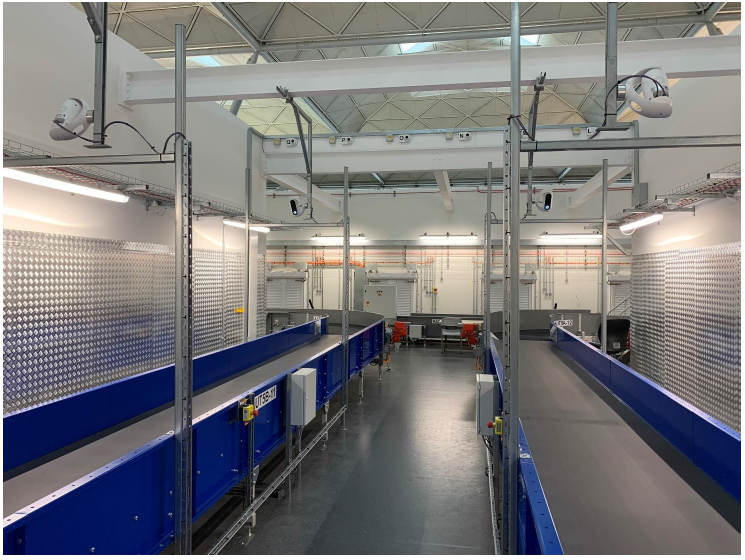
Vertical lifts
Bags are conveyed from the concourse to mezzanine level via two vertical lifts. Lifts were used in the solution due to the lack of space available for a traditional decline conveyor. The lifts used were quiet and could achieve the high throughputs required for the solution.
Powered by a unique Rubber Block Chain, these vertical lifts reliably transport loads from heights of up to 120 ft, and in temperatures as high as 280 degrees F and as low as -50 degrees F.
Robson have successfully integrated continuous lifts into both departure and arrival lines and have introduced a variety of technical innovations and adaptions into these deployments to ensure optimal levels of performance.
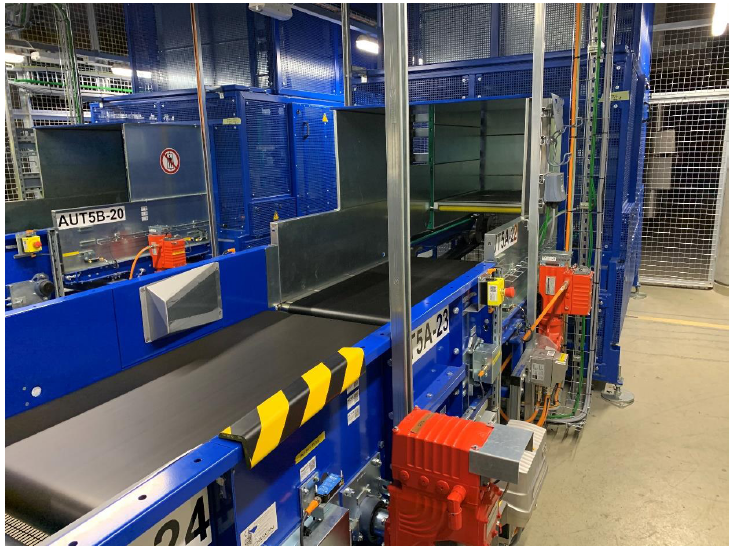
Mobile HMI’s – Operator control… where you need it.
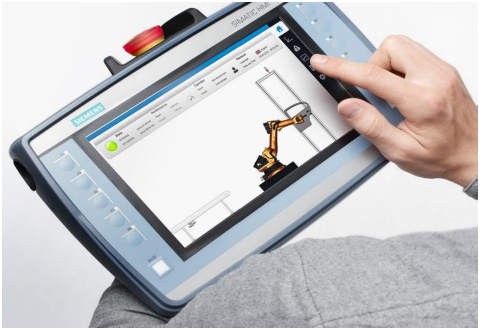 Deployed with a 9-inch display and wired connection, the mobile operator panels transfer the functionality and performance of traditional panel-based HMIs to mobile control units, thus supporting the Robson aspiration to truly mobilise their client’s workforce.
Deployed with a 9-inch display and wired connection, the mobile operator panels transfer the functionality and performance of traditional panel-based HMIs to mobile control units, thus supporting the Robson aspiration to truly mobilise their client’s workforce.
Featuring a 16:9 aspect ratio and 16 million colours, the brilliant widescreen display provides clear, detail-rich visualisations, even of complex process and plant images, such as the Vertical Lifts.
Mobile operator panels allow fast and precise setting to works of conveyor lines during commissioning. They also ensure shorter downtimes during subsequent maintenance or repairs.
The mobile HMI can be plugged in at various positions along the line, with visualisation and emergency stop functionality varying depending upon the location of the operator.
Camera-Based Automatic Tag Readers – up to 99.5% accuracy
Automatic tag readers are installed downstream of the Lifts in order to determine IATA tag details and rout the bag to the correct make-up point.
Regardless of the position or orientation of the bag on the belt, Robson selects camera-based barcode readers that can locate, read and decode any barcode. Fewer unread codes mean fewer bags miss their flights, which increases total baggage handling system efficiency, reduces manual encode operations and improves customer satisfaction.
The camera-based technologies used to read bag tag information:
- Achieve high read rates, regardless of barcode quality or orientation
- Cover more of the belt with fewer readers
- Capture a full-colour photo of each processed bag to visually analyse the cause of unread codes and im-prove tracking and security
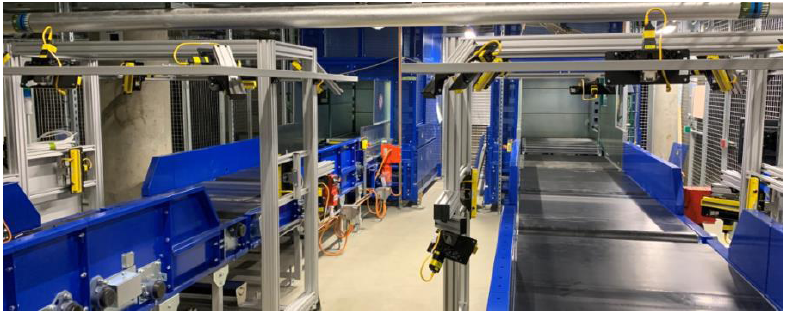
- Why Robson?
Robson / Stansted Airport have worked collaboratively for many years on previous projects, delivering baggage system projects on time, to specification, and within budget. Over time Stansted Airport have come to trust Robson and the solutions we provide. Moreover, Stansted trusted Robson to identify & integrate new technologies into the baggage system which improve efficiency and performance. During the tender phase, Robson demonstrated how the additional capacity could be achieved with the latest Robson smart line controls solution integrating the highly efficient IE4 motors providing a dynamic and reliable sortation solution.
- Project Timescales?
This project had very tight timescales with challenging work areas (public and airside), with careful and collaborative planning/ phasing engaging with the stakeholders throughout, the tight deadlines were achieved in total partnership.
- 3D Interactive tour?
Please click to https://www.robson.co.uk/industries/airports/ for a system virtual tour, walk through the system, exploring the latest technology installed at your leisure.
Contact
Coleford Road
Sheffield
United Kingdom
S9 5PA
- +44 (0) 1142 444 221

